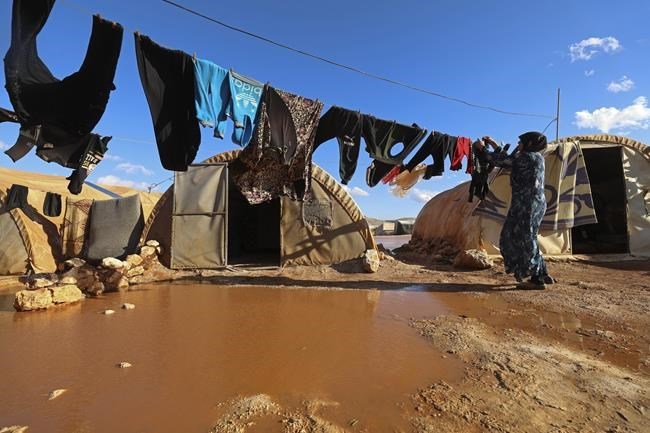UNITED NATIONS (AP) — The U.N. Security Council failed to extend humanitarian aid deliveries to 4.1 million Syrians in the rebel-held northwest from Turkey on Friday after Russia vetoed a resolution for a year-long extension and got insufficient support for its resolution for a six-month extension.
The failure of the U.N.’s most powerful body to agree on an extension came two days before Sunday’s expiration of its one-year mandate for deliveries through the Bab al-Hawa border crossing.
Norway’s U.N. Ambassador Mona Juul and U.S. Ambassador Linda Thomas-Greenfield said after the two votes that they will continue trying to reach an agreement among the 15 council members so aid is not stopped.
The vote on the resolution for a one-year extension drafted by Norway and Ireland was 13 countries in favor, Russsia voting against and China abstaining.
The vote on the rival Russian resolution for a six-month extension was two countries in favor, three against, and 10 abstentions, far below the minimum nine “yes” votes needed for approval. The three countries voting against the Russian draft were the U.S., Britain and France, all veto-wielding members.
The U.N. said last week that the first 10 years of the Syrian conflict, which started in 2011, killed more than 300,000 civilians — the highest official estimate of civilian casualties. Northwest Idlib is the last rebel-held bastion in Syria and a region where an al-Qaida-linked militant group, Hayat Tahrir al-Sham, is the strongest.
Russia, a close ally of Syria's government, has repeatedly called for stepped up humanitarian aid deliveries to the northwest from within Syria, across conflict lines. This would give Syrian President Bashar Assad’s government more control.
In early July 2020, China and Russia vetoed a U.N. resolution that would have maintained two border crossing points from Turkey for humanitarian aid to Idlib. Days later, the council authorized the delivery of aid through just one of those crossings, Bab al-Hawa.
In a compromise with Russia, that one-year mandate was extended on July 9, 2021, for six months, with an additional six months subject to a “substantive report” from U.N. Secretary-General Antonio Guterres. This was effectively a year-long mandate because a second resolution wasn’t needed, and that mandate expires this Sunday.
U.N. spokesman Stephane Dujarric called cross-border aid critical for men, women and children in the northwest and stressed the importance of long-term planning, including to costs.
“In 2021, we had 800 trucks of cross-border aid go through each month, consistently reaching about 2.4 million people,” he told reporters Thursday. “The number of trucks that crossed in the calendar year, from January of this year to June 30th of this year, was 4,648 trucks.”
The U.N. also carried out five deliveries across conflict lines last year and so far this year with about 2,529 metric tons of assistance including foods and health supplies, he said.
Edith M. Lederer, The Associated Press



